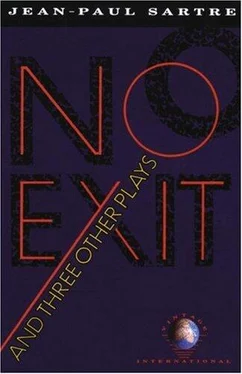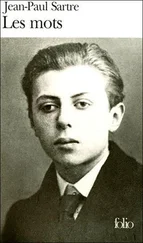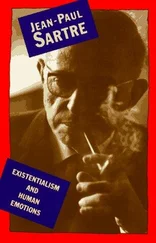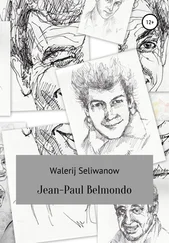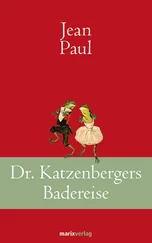VALET: You can't move it. It's too heavy.
GARCIN: You're right. It's too heavy.
VALET: Very well, sir, if you don't need me any more, I'll be off.
GARCIN: What? You're going? Wait. That's a bell, isn't it? And if I ring, you're bound to come?
VALET: Well, yes, that's so- in a way. But you can never be sure about that bell. There's something wrong with the wiring, and it doesn't always work.
GARCIN: It's working all right.
VALET: So it is. But I shouldn't count on it too much if I were you. It's- capricious. Well, I really must go now. Yes, sir?
GARCIN: No, never mind. What's this?
VALET: Can't you see? An ordinary paper-knife.
GARCIN: Are there books here?
VALET: No.
GARCIN: Then what's the use of this? Very well. You can go.
(Garcin is by himself. He goes to the bronze ornament and strokes it reflectively. He sits down; then gets up, goes to the bell-push, and presses the button. The bell remains silent. He tries two or three times, without success. Then he tries to open the door, also without success. He calls the VALET several times, but gets no result. He beats the door with his fists, still calling. Suddenly he grows calm and sits down again. At the same moment the door opens and INEZ enters, followed by the VALET›)
How does Sartre create a sense of place through dialogue? Can you imagine what it feels like to stay awake all the time with the lights on with no hope of leaving a specific place? How does GARCIN react to this hell? How could you twist your daily activities around so that everyday habits become hell? Is there a pattern of circumstances that reinforces the experience of hell?
VALET:Did you call, sir?
GARCIN: (About to answer "yes", but sees INEZ and says) No.
VALET: This is your room, madam. If there's any information you require-? Most of our guests have quite a lot to ask me. But I won't insist. Anyhow, as regards the toothbrush, and the electric bell, and that thing on the mantelshelf, this gentleman can tell you anything you want to know as well as I could. We've had a little chat, him and me. (Exits.)
INEZ: Where's Florence? Didn't you hear? I asked you about Florence. Where is she?
GARCIN: I haven't an idea.
INEZ: Ah, that's the way it works, is it? Torture by separation. Well, as far as I'm concerned, you won't get anywhere. Florence was a tiresome little fool, and I shan't miss her in the least.
GARCIN: I beg your pardon. Who do you suppose I am?
INEZ: You? Why, the torturer, of course.
GARCIN: Well, that's a good one! Too comic for words. I the torturer! So you came in, had a look at me, and thought I was-er-one of the staff. Of course, it's that silly fellow's fault; he should have introduced us. A torturer indeed! I'm Joseph Garcin, journalist and man of letters by profession. And as we're both in the same boat, so to speak, might I ask you, Mrs.-?
INEZ:Not "Mrs." I'm unmarried.
GARCIN: Right. That's a start, anyway. Well, now that we've broken the ice, do you really think I look like a torturer? And, by the way, how does one recognize torturers when one sees them? Evidently you've ideas on the subject.
INEZ: They look frightened.
GARCIN: Frightened? But how ridiculous! Of whom should they be frightened? Of their victims?
INEZ: Laugh away, but I know what I'm talking about. I've often watched my face in the glass.
GARCIN: In the glass? How beastly of them! They've removed everything in the least resembling a glass. Anyhow, I can assure you I'm not frightened. Not that I take my position lightly; I realize its gravity only too well. But I'm not afraid.
INEZ: That's your affair. Must you be here all the time, or do you take a stroll outside, now and then?
GARCIN: The door's locked.
Oh!… That's too bad.
GARCIN: I can quite understand that it bores you having me here. And I too-well, quite frankly, I'd rather be alone. I want to think things out, you know; to set my life in order, and one does that better by oneself. But I'm sure we'll manage to pull along together somehow. I'm no talker, I don't move much; in fact I'm a peaceful sort of fellow. Only, if I may venture on a suggestion, we should make a point of being extremely courteous to each other. That will ease the situation for us both.
INEZ: I'm not polite.
GARCIN: Then I must be polite for two.
INEZ: Your mouth!
GARCIN: I beg your pardon.
INEZ: Can't you keep your mouth still? You keep twisting it about all the time. It's grotesque.
GARCIN: So sorry. I wasn't aware of it.
INEZ: That's just what I reproach you with. Ther you are! You talk about politeness, and you don't even try to control your face. Remember you're not alone; you've no right to inflict the sight of your fear on me.
GARCIN: How about you? Aren't you afraid?
INEZ: What would be the use? There was some point in being afraid before, while one still had hope.
GARCIN: There's no more hope-but it's still "before." We haven't yet begun to suffer.
INEZ: That's so. Well? What's going to happen?
GARCIN: I don't know. I'm waiting. (Enter ESTELLE with the VALET. She looks at GARCIN whose face is still hidden by his hands.)
ESTELLE: No. Don't look up. I know what you're hiding with your hands. I know you've no face left. What! But I don't know you!
GARCIN: I'm not the torturer, madam.
ESTELLE: I never thought you were. I -I thought someone was trying to play a rather nasty trick on me. Is anyone else coming?
VALET: No, madam. No one else is coming.
ESTELLE: Oh! Then we're to stay by ourselves, the three of us, this gentleman, this lady and myself. (laughs.)
GARCIN:There's nothing to laugh about.
ESTELLE: It's those sofas. They're so hideous. ANd justlook how they've been arranged. It makes me think of New Year's Day-when I used to visit that boring old aunt of mine, Aunt Mary. Her house is full of horror like that…I suppose each of us has a sofa of his own. Is that one mine? But you can't expect me to sit on that one. It would be too horrible for words. I'm in pale blue and it's vivid green.
INEZ: Would you prefer mine?
ESTELLE: That claret-colored one, you mean? That's very sweet of you, but really- no, I don't hink it'd be so much better. What's the good of worrying, anyhow? We've got to take what comes to us, and I'll stick to the green one. The only one which might do at a pinch, is that gentleman's.
INEZ: Did you hear, Mr. Garcin?
GARCIN: Oh- the sofa, you mean. So sorry. Please take it, madam.
ESTELLE: Thanks. Well, as we're to live together, I suppose we'd better introduce ourselves. My name's Rigault. Estelle Rigault.
INEZ: And I'm Inez Serrano. Very pleased to meet you.
GARCIN: Joseph Garcin.
VALET: Do you require me any longer?
ESTELLE: No, you can go. I'll ring when I want you.
INEZ: You're very pretty. I wish we'd had some flowers to welcome you with.
ESTELLE: Flowers? Yes, I loved flowers. Only they'd fade so quickly here, wouldn't they? It's so stuffy. Oh, well, the great thing is to keep as cheerful as we can, don't you agree? Of course, you, too, are-
INEZ: Yes. Last week. What about you?
ESTELLE: I'm- quite recent. Yesterday. As a matter of act, the ceremony's not quite over. The wind's blowing my sister's veil all over the place.
She's trying her best to cry. Come, dear! Make another effort. That's better. Two tears, two little tears are twinkling under the black veil. Oh dar!
What a sight Olga looks this morning! She's holding my sister's arm, helping her along. She's not crying, and I don't blame her, tears always mess one's face up, don't they? Olga was my bosom friend, you know.
INEZ: Did you suffer much?
ESTELLE: No. I was only half conscious, mostly.
INEZ:What was it?
ESTELLE: Pneumonia. It's over now, they're leaving the cemetery. Good-by. Good-by. Quite a crowd they are. My husband's stayed at home.
Читать дальше
